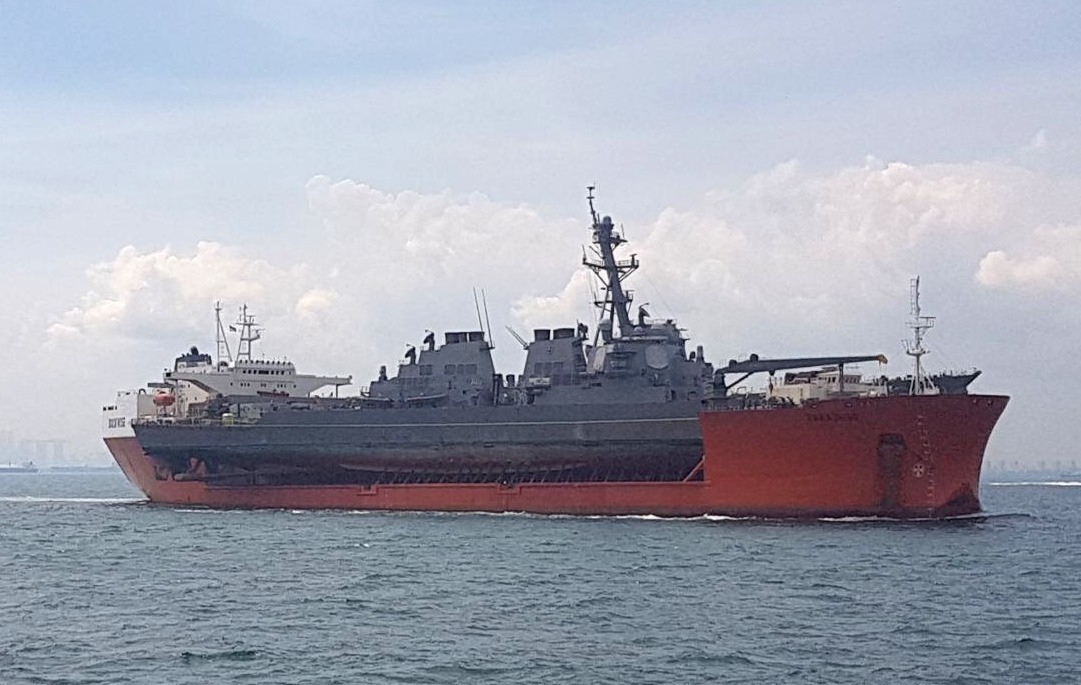
Congress passed another continuing resolution to keep the government open until Jan. 19, inserting into the bill an additional $4.7 billion in missile defense-related spending but putting in peril a flurry of planned ship buys in January.
This year, Fiscal Year 2018, began with a continuing resolution, which was extended just before it expired on Dec. 8. Lawmakers then punted the decision two weeks, and last night Congress again pushed their tough budget decisions down the road by four more weeks.
In addition to extending the CR, the bill passed by lawmakers Thursday night and signed by President Donald Trump this morning adds $673.5 million in emergency funding to the Navy’s operations and maintenance account “for necessary costs to repair damage to the U.S.S. John S. McCain and the U.S.S. Fitzgerald,” both of which were damaged in fatal collisions earlier this year.
The bill adds nearly $4.7 billion for missile defense-related expenditures, including the McCain and Fitzgerald repair funds – both ships were equipped with ballistic missile defense capabilities and conducted BMD patrols in the Pacific – $1.24 billion for various Defense Department-wide procurement efforts “to detect, defeat, and defend against the use of ballistic missiles,” $1 billion for defense-wide BMD research efforts, $884 million for Army missile procurement, $288 million for Air Force “other” procurement to support BMD, $12 million for Air Force missile procurement, $255 million for Air Force BMD research activities, $60 million for Navy BMD research, $20 million for Army BMD research, $18.8 million for Air Force BMD operations and maintenance activities, $23.7 million for Defense Department-wide BMD O&M activities, and $200 million for construction of a missile field in Alaska.
Aside from those BMD spending lines, under the CR the Defense Department will continue to be limited to 2017 spending levels – meaning no new programs can start and spending levels for individual programs cannot increase – which is bad news for Navy shipbuilding and ship maintenance.
USNI News reported on Dec. 8 that “the Navy plans to award a $466-million contract in January for the second John Lewis-class T-AO(X) fleet oiler; a $76-million contract in January for a T-ATS towing and salvage ship; a $32-million contract in January for the LCU-1700 amphibious surface connector; and a contract in January for DDG-51 advance procurement on the Vertical Launch System. In June, the Navy would award a five-year multiyear contract award for the DDG-51s.”
Similarly, the Navy told USNI News on Dec. 8, in the short term, “the Navy believes it can manage the ship maintenance program without canceling any availabilities. If the CR were extended beyond late January 2018, the Navy may delay the induction of 10 ships, which will exacerbate the planned ship maintenance in FY18, and will slip ship availabilities into FY19, further impacting that plan.”
“Using tools such as split-funding contract line items and minimally funding Navy Working Capital Fund activities, the Navy has managed not to defer any availabilities during the current CR period. However, the following FY18 ship availabilities will be considered for schedule slip if the CR were to be extended through six months,” the Navy statement continued, listing at-risk availabilities for: USS Coronado (LCS-4), set to begin maintenance on Dec. 15 in San Diego; USS Port Royal (CG-73), set to begin maintenance on Dec. 22 in Hawaii; USS Princeton (CG-59), set to begin maintenance on Dec. 25 in San Diego; USS San Diego (LPD-22), set to begin maintenance on Dec. 31 in San Diego; USS Carter Hall (LSD-50), set to begin maintenance on Jan. 22 in Norfolk, Va.; USS Oscar Austin (DDG-79), set to begin maintenance on Feb. 2 in Norfolk; USS Vella Gulf (CG-72), set to begin maintenance on Feb. 19 in Norfolk; USS James E. Williams (DDG-95), set to begin maintenance on Feb. 19 in Norfolk; USS Mahan (DDG-72), set to begin maintenance on Feb. 19 in Norfolk; and USS Chafee (DDG-90), set to begin maintenance on Feb. 26 in Hawaii.
Senate Armed Services Committee Chairman Sen. John McCain (R-Ariz.) released a statement Thursday night criticizing Congress for failing to pass a proper 2018 budget for the military, noting that “as we wait another four weeks in hopes that Congressional leaders negotiate a compromise, the military will work overtime to keep an already dire situation from getting worse. Readiness will continue to decline. Service members will not receive scheduled training. Ship maintenance backlogs will grow. All of this in the face of a world that only gets more dangerous and where threats continue to rise. As competitors like China, Russia, and North Korea continue to rapidly advance their military and modernize their weapons, the U.S. military will wait.
“The additional four week Continuing Resolution will have real consequences for the Department of Defense. It will prevent 48 new starts and 24 production increases. One particularly troublesome example of this is munitions. Earlier this year, military leaders all stressed the need to repair the munitions shortfall. … The extended Continuing Resolution will cause delays to critical weapon systems, as DOD will be unable to award contracts to systems such as the Guided Multiple Launch Rocket System or the Long Range Anti-Ship Missile,” McCain’s statement continues.
“In a time when more service members are dying in routine accidents than in combat, and our sailors are working 100-hour weeks, asking the military to wait another four weeks for adequate funding is unacceptable—and it is a dereliction of the first and foremost duty of Congress to provide for the common defense.”





